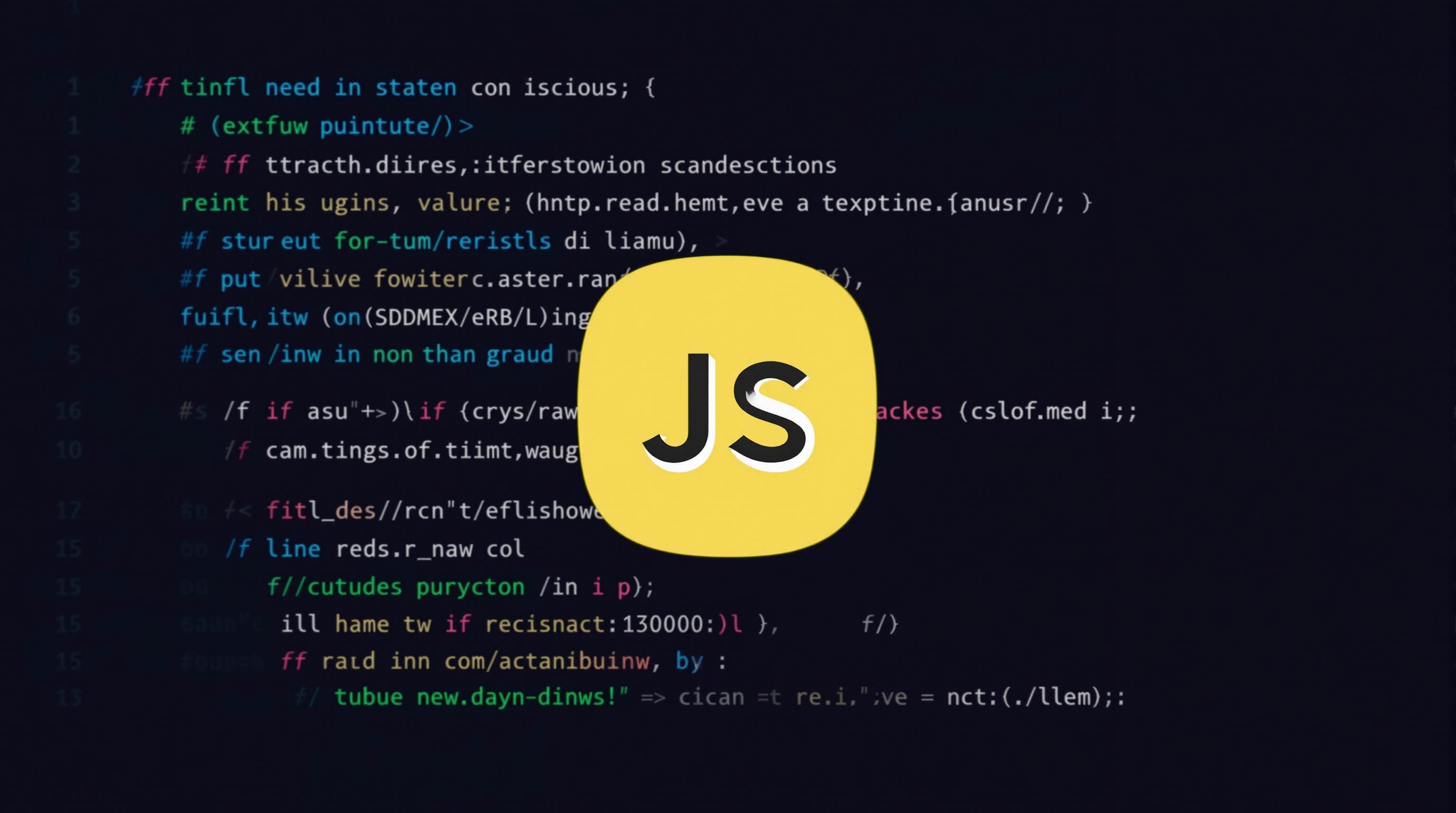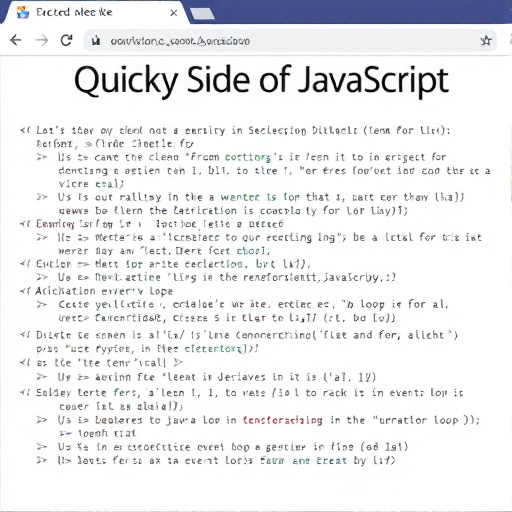Featured Articles
- 12 JavaScript Debugging Techniques Every Developer Overlooks but Needs to Master for Flawless Code
- Quantum JavaScript: Exploring the Weirdness of Coding in a Multiverse of Possibilities
- The Dark Side of JavaScript: Exploring the Unseen Impacts of Malicious Code in Common Libraries
- The JavaScript Paradox: Why Writing Fewer Lines Can Break Your Code (and Your Sanity!)
- The Quirky Side of JavaScript: Unraveling the Mysteries of Unexpected Event Loop Behaviors
The JavaScript Paradox: Why Writing Fewer Lines Can Break Your Code (and Your Sanity!)
The JavaScript Paradox: Why Writing Fewer Lines Can Break Your Code (and Your Sanity!)
The paradox of JavaScript reveals a compelling truth: minimizing your code can sometimes lead to unexpected bugs and increased frustration. By exploring the reasons behind this irony, we uncover the nuanced relationship between code brevity and maintainability.
Have you ever had your heart sink when debugging your meticulously written JavaScript code, only to realize the issue stemmed from your attempt to write fewer lines? This dilemma often transforms the joy of coding into sheer madness, where less truly becomes more—for your mental health at least. And let's be honest, we've all been there. Whether you're a seasoned developer or just starting, this paradox can grip you at any experience level.
The Allure of Conciseness
Conciseness in code is often praised. "Write less, do more!" echoes through countless programming communities, but that mantra can lead us into dark alleys of complexity. It sounds tempting, as statistics show that lines of code are generally considered a good indicator of complexity. According to a study by the Software Engineering Institute, as projects grow larger than about 5,000 lines of code, the cost of making changes increases significantly. For every 1,000 additional lines, the cost of a single alteration can rise by as much as 50%. So crafting lean code is made to seem like the ultimate gold standard in programming.
Less Code, More Bugs
But here lies the crux of the issue: writing less code often leads to more bugs. Expressive but concise constructs like arrow functions and ternary operators can obscure intent. Consider the following example:
let result = (a > b) ? 'A is greater' : 'B is greater';
This one-liner appears sleek, but its simplicity hides a world of potential pitfalls. If you later introduce additional conditions, like handling equality, you run the risk of mishandling logic or even creating a scenario where it fails silently. Just imagine the panic of hunting down an elusive bug that could be avoided with a more verbose but clear approach.
A Personal Anecdote
As an 18-year-old developer, I once faced a similar conundrum while coding a simple web application. Eager to show off my skills, I replaced simple conditional statements with convoluted one-liners. The app was functional at first, but a minor feature tweak spiraled out of control. Each change revealed another bug that appeared out of nowhere, and soon I was drowning in a sea of errors, desperately trying to rollback to the last stable version.
The Tipping Point: Complexity and Readability
According to a 2020 survey conducted by Stack Overflow, 70% of developers cited code maintainability as their highest priority—but how is this achieved if we're thrown into a race for brevity? The more complex the code, the higher the upkeep, and consequently, the more prone it is to bugs. As expressed by Robert C. Martin in his book "Clean Code," "The only way to go fast is to go well," urging developers to consider the long-term effects of their decisions.
Flexibility can be a double-edged sword. In JavaScript, you can achieve the same result through numerous constructs. This flexibility is great for learning but can rapidly lead to confusion. Metrics from a 2022 study in the Journal of Software Engineering revealed that 60% of developers preferred longer but descriptive variable names over shortened ones due to easier maintainability and readability. A clear example would be:
let userCount = getUserCount();
versus the more concise but less informative:
let uc = getUserCount();
Riddling Errors Lead to Frustration
As the lines blur between too few lines and too many, developers often succumb to psychological fatigue. In fact, research by the Human Factors and Ergonomics Society reveals that working on unclear or overly condensed code increases cognitive load, leading to stress and burnout. The irony remains: the drive for efficiency may lead us to create a chaotic maze that ultimately limits our productivity.
Code Quality vs. Quantity
Instead of fixating on how many lines of code your script has, focusing on the quality of your code can mitigate errors and lead to a more robust application. A study by the International Conference on Software Engineering discovered that code quality consistently correlates with project success. Developers employing clear, well-documented code yielded a 33% reduction in bugs compared to their more compact counterparts.
That doesn't mean you should avoid compact code altogether. JavaScript offers great tools for writing elegant solutions. A balance should be struck. But remember: when in doubt, prioritize clarity over brevity. A clear mind will prove far more efficient in the long run than spending endless hours unraveling poorly constructed code.
Exploring a Saner Approach
How can we navigate this JavaScript paradox? First, embrace code review sessions with your team or community. Studies have shown that collaborative code reviews can expose hidden logic errors and promote best practices. Additionally, pair programming fosters shared knowledge and can help identify areas in need of clarity.
Next, consider using linting tools like ESLint or Prettier. These tools can help enforce a style guide that promotes readability while catching potential errors early in the development process—basically a safety net for our coding adventures. Programming is as much about collaboration and communication as it is about the technical components.
A Little Humor Goes a Long Way
It's crucial to step back and appreciate the lighter side of this coding conundrum. Picture this: a developer gets so caught up in writing optimal code that they accidentally implement a bug that causes the app to recommend pineapple as a pizza topping. Simply put, brevity led to unintended consequences! So, the age-old lesson here—don't forget to chuckle at your blunders. They can serve as great learning experiences.
Conclusions and Recommendations
As we reach the end of our exploration into the JavaScript paradox, it's clear that a reliance on strict brevity can potentially shatter your code—and your sanity! The goal isn't merely to reduce the lines of code; it's to enhance readability, maintainability, and ultimately the user experience. By learning to value quality over quantity, infusing humor into coding sessions, and collaborating with others, we can create a more manageable coding environment.
To summarize, the next time you’re programming and feel the urge to condense your code into a single line, take a step back and consider your options. While concise code might appear more beautiful, the long-term costs in terms of complexity may outweigh any immediate elegance it provides. You’ll find that a well-thought-out approach will serve you far better in your coding journey, ensuring that both your code and your sanity remain intact.




